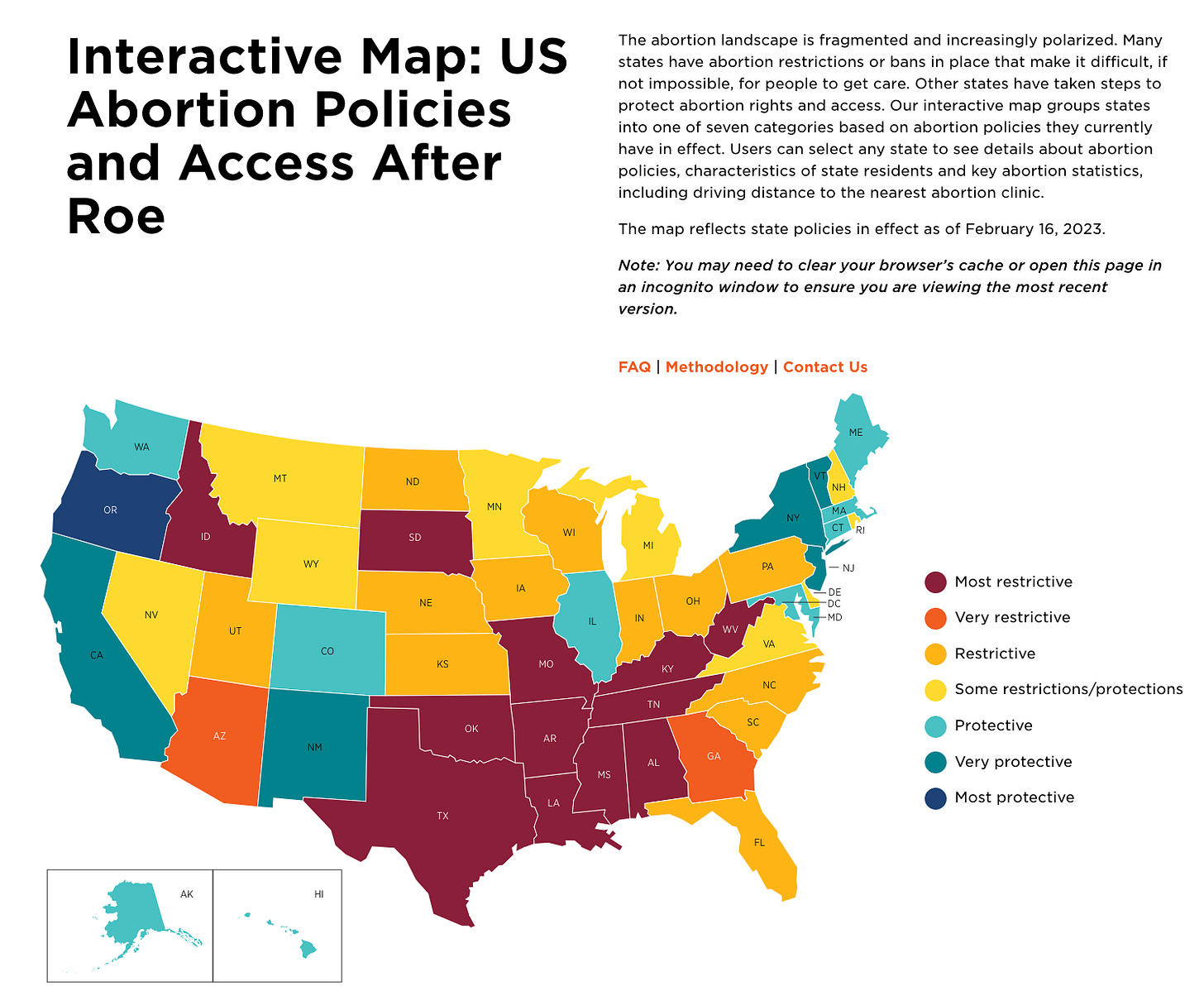Starting Out in a Land Less Free
Choices and opportunities narrow for Gen Z as states strip their rights
Applying to college or grad programs and starting out in the work world are exciting but anxious times. It’s hard for me to imagine being a young person doing these things today. After high school, I moved around a lot as I changed schools, employers, and careers. Twice I left the Northeast: At 17, I chose to go to college in Nashville, Tennessee and at 27, I took a marketing job in Boise, Idaho. Though I stayed in neither place long, those were two valuable experiences that helped me build my resume and come to know myself — and my country — a bit better. They would not be options for me if I was a young woman today.

Let’s start with Tennessee. Last summer, the state effected one of the country’s most draconian trigger laws upon the overturning of Roe v. Wade. A young person there who is raped or whose partner becomes pregnant by accident or who needs medical assistance during a miscarriage is now subject to a near total ban on abortion. Tennessee’s governor wants $100 million for so-called crisis pregnancy centers; anyone entering one of these seeking modern health care would be gravely mistaken.
Students at Vanderbilt, where I spent my freshman year, and at the state’s dozens of other schools have found it harder to vote for the elected officials making the decisions that affect their daily lives and their futures. Tennessee has sought to disenfranchise students by enacting voter ID laws that disallow them from entering the voting booth with a student ID or out-of-state driver’s license.
Then there’s Idaho, where a new bill disallowing student IDs as voter IDs has just passed out of committee and where employees of the University of Idaho are operating under strict gag orders not to talk about abortion after the state’s ban went into effect last year. Idaho’s ban is also among the most restrictive in the nation.
Location has always been key in college and job searches. Students and workers consider how close or far they can or want be from home and whether a city or a small town is a better fit for them. Of course, plenty of young people don’t have the luxury of fretting about fit when it comes to college or career; the cost of tuition or cost of living can dominate these decisions. And many have long found their choices and mobility narrowed by bigotry, discrimination, and worries about personal safety. Students of color and religious minorities have had to evaluate whether a school’s claims of a welcoming, inclusive culture are true. LGBTQ+ job seekers have had to weigh the level of homophobia in a region.
Today, far more young people have more to consider than did those starting out in the past several decades. As Eileen Clancy put it, college applicants would now benefit from a safety dashboard embedded in programs like Naviance that help them sort schools by academic reputation, availability of majors, cost, and other criteria. This dashboard would have to include data like Guttmacher Institute’s interactive map:
College applicants now have to understand whether a school is in a state that will allow them to learn a full American history. Will the school abruptly cancel classes on race and ethnicity or other topics they’re interested in as has happened in states including Oklahoma and Florida after the passage of education censorship laws? Will their instructors be threatened for teaching about racial justice, as was the professor suspended last week at Palm Beach Atlantic University? Will the school be prohibited from providing diversity, equity, and inclusion (DEI) training, as schools have been in numerous states? Will the school be suddenly remade from the top down in the image of ultraconservative Hillsdale, as at New College of Florida?
Applicants have to understand whether hurdles will be thrown in the way of their right to vote through various voter suppression methods beyond voter ID laws such as the removal of convenient or accessible polling places. A bill was just proposed in Texas to disallow polling places on any college campus.
Young people choosing where to start their careers have to worry about what kind of reproductive, marriage, and family rights they would have now and in the future. Only 16 of the 50 states are considered by Guttmacher Institute to have policies in place that protect abortion. Gay marriage could be outlawed in between 25 and 32 states if Obergefell is overturned by the Supreme Court, something Justice Clarence Thomas has encouraged. Will they have access to contraception? Some states are already targeting it. A judge in Texas has shown the way.
This kind of information-gathering and decision-making is already happening. Before this school year, roughly 4 in 10 prospective students surveyed said “the U.S. Supreme Court's overturning of Roe v. Wade will impact their decision to attend college in a particular state” and 4 in 10 current students said it would affect whether or not they stay in the state their college is in. Red states stripping away their rights means not just students but all young people — especially those who find themselves unable to leave these repressive states — have fewer choices, fewer opportunities, less freedom.
As their legislators chase the donations and votes of older conservative voters with extreme laws, red states seem likely to experience a brain drain as young people seek safety and prosperity elsewhere. Their loss may be to blue states’ economic gain but at what cultural, social, and political cost to all of us?
While I was drafting this piece, Congressperson Marjorie Taylor Greene advocated on social media for a kind of sorting, calling for a separation of red and blue states in a “national divorce” (BTW, this is what Twitter looks like under Musk — national political leaders freely calling for the dissolution of the United States of America.) Right-wing extremists in state governments are already facilitating the separation.
Here are some organizations working to restore and protect hard-won rights for Americans, regardless of where they are in their lives or in the nation.
Planned Parenthood Action Fund
7 Organizations to Donate to as Roe v. Wade Is Overturned






